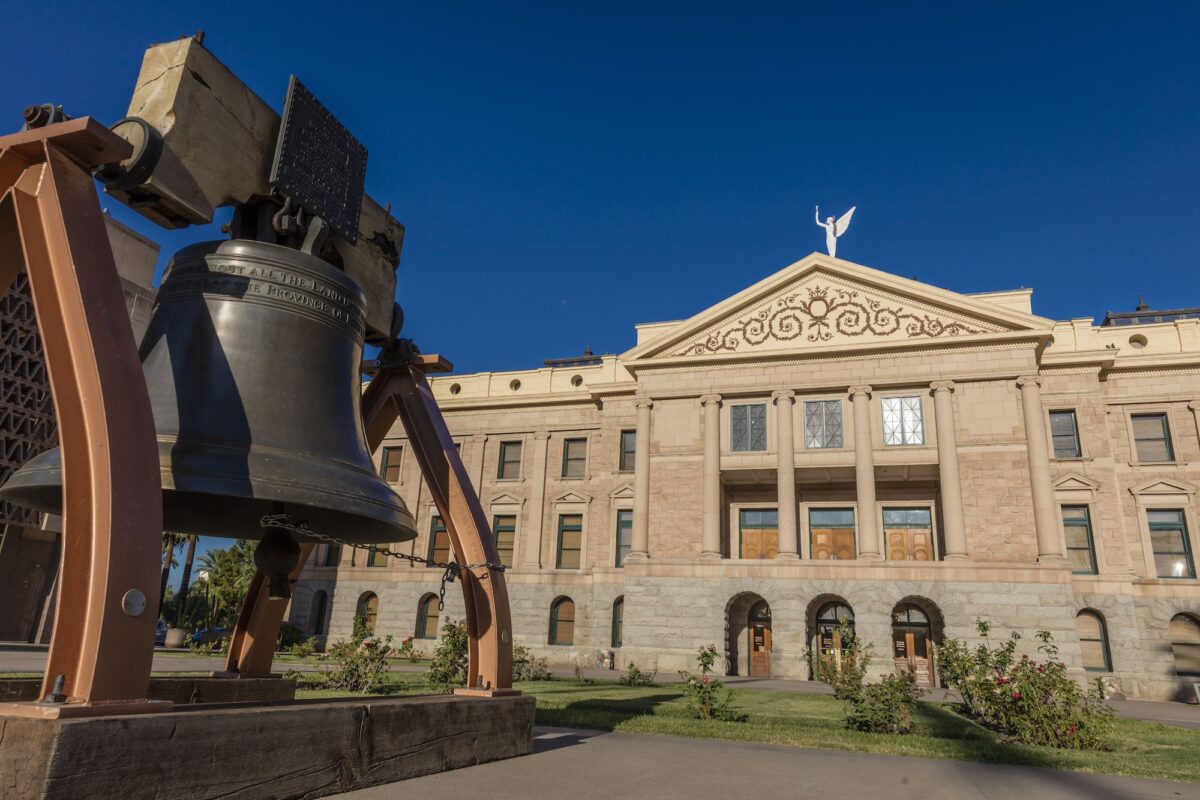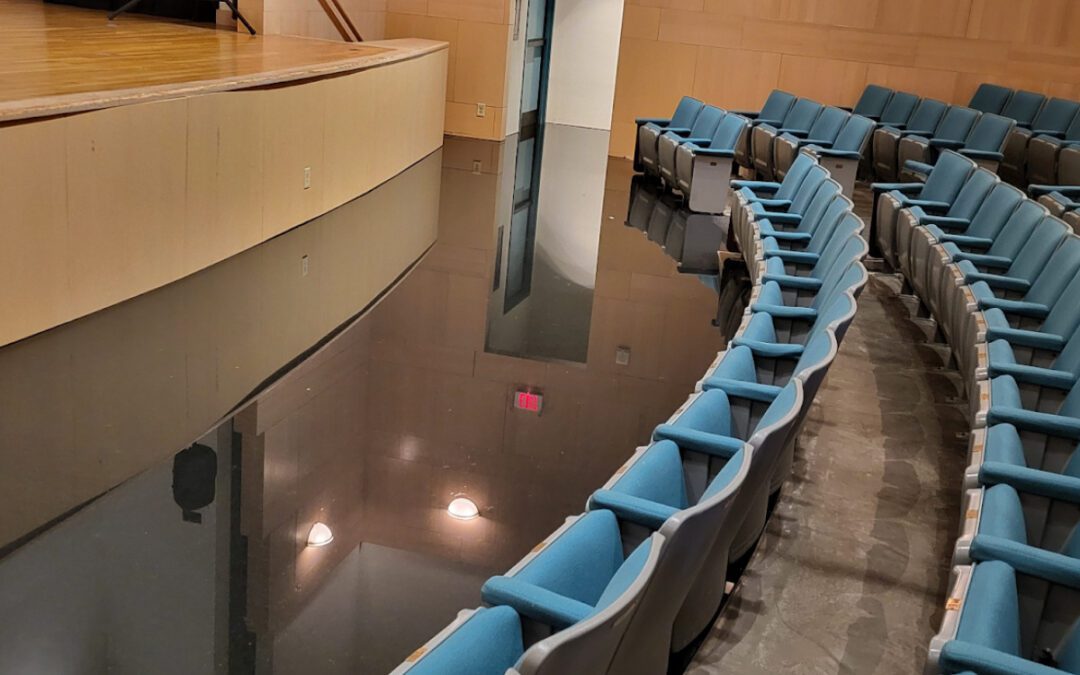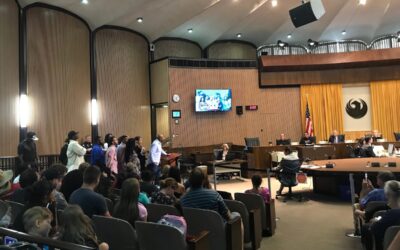
PHOENIX ARIZONA, Replica of Liberty Bell in front of Arizona State Capitol Building at sunrise. (Photo by: Joe Sohm/Visions of America/Universal Images Group via Getty Images)
Progress Arizona just released its annual scorecard to help Arizonans assess their legislators’ voting records on key issues affecting the state.
Since President Donald Trump’s return to the Oval Office, the country has seen a wave of federal legislation targeting LGBTQ+ communities, immigrant rights, healthcare, and more. With it has come waves of protest from Arizonans, urging their elected officials to fight back.
The 2025 legislative session was filled with notable and potentially harmful legislation, including Republican-backed bills that would force state agencies to cooperate with Immigration and Customs Enforcement (ICE), target LGBTQ+ rights, and make it harder to vote, among others.
Some Arizona lawmakers have opted to ally themselves with Trump, introducing bills at the local level to make it easier for the administration to implement his agenda. On the other hand, other officials have rallied against legislation that directly harms Arizonans.
That’s why Progress Arizona, a nonprofit focusing on voter education and advocacy, released its Progress Scorecard to allow Arizona voters to easily assess their legislators voting records and see if their representatives are meeting the political moment and protecting Arizonans.
How does the scorecard work?
The legislative session began in January and wrapped up in June, with hundreds of bills introduced. The Scorecard gives legislators a ranking based on how they vote on legislation that impacts topics like climate justice, education, gun safety, healthcare, housing, LGBTQ+ rights, mass incarceration, reproductive justice, and voting rights.
Some Republican-backed bills introduced this session targeted Arizonans’ access to the ballot box, while others attempted to undo the victory of Proposition 139, which protects reproductive rights.
Regardless of which political party introduced a piece of legislation, Progress Arizona examined 242 “priority bills,” and assigned them a rating conditional on how much good or harm it would cause Arizonans. It consulted with over 30 community organizations, labor unions, and advocacy groups to determine which bills should be considered in the Scorecard.
Twenty-nine bills in the 2025 session were given double the weight due to the perceived harm they posed to Arizonans. One bill, House Bill 2017, introduced by a member of the far-right Arizona Freedom Caucus Rep. Rachel Keshel, would have required voters to cast their ballots at a designated neighborhood polling place serving only 1,000 voters. If a voter went to the wrong location, their ballot would be thrown out. Gov. Katie Hobbs later vetoed the bill.
Another bill with double the weight is Senate Bill 1164, or the Arizona ICE Act, which would have required local police to cooperate with Immigrations and Customs Enforcement (ICE) to assist in deportations. The bill saw large pushback from the community before it was ultimately vetoed by Hobbs
The purpose of the Scorecard is simple–to show Arizonans what their representatives are voting for and hold them accountable.
“Rather than confronting Arizona’s urgent crises—soaring living costs, an acute housing shortage, underfunded public education, and an escalating water crisis—lawmakers chose to channel their energy into harmful, ideologically driven attacks on voting rights, immigrants, and LGBTQ+ youth,” said Casey Clowes, spokesperson for Progress Arizona. “Despite the Governor’s consistent vetoes, the Legislature squandered time and taxpayer dollars advancing policies that do nothing to improve Arizonans’ lives.”
The Scorecard also weighs the absence of legislators, as an absence can contribute to the outcome of a bill. The website makes it easy to examine every Arizona lawmaker and assess how they voted. You can sort the results in ascending or descending order, search by a lawmaker’s name, filter by party, and more.
Standout scores
This year’s Scorecard was reflective of the fractious political climate, but many lawmakers have still risen to the challenge of standing up for their constituents.
Arizona State Sen. Analise Ortiz, a Democrat, received the highest score at 95.8 for voting in favor of progressive legislation. Trailing her are State Sen. Lauren Kuby, also a Democrat, and State Sen. Mitzi Epstein, who both scored above 90 for their voting records.
The highest rate for a Republican lawmaker was State Sen. Jake Hoffman at just 17.4.
The Scorecard provides a detailed history of each bill and how each lawmaker voted in order to illustrate the rating given. People accessing the tool can even compare legislators’ records from previous years as the Scorecard keeps annual archives of their records.
At the bottom of the list is Michael Way, a pro-Trump Republican who voted against progressive legislation enough times to earn him a score of 8.2 despite having a 98% attendance rate.
The Scorecard doesn’t discriminate against political parties, either. Many Democrats received low rates for voting against progressive legislation, with at least eight democrats earning a score of 80 or less.
Progress Arizona devotes significant time and resources to the Scorecard to help constituents keep eyes on their lawmakers. The tool also includes contact information for each legislator, making it simple for voters to reach out to express either praise or concerns with their voting history.
“Arizonans expect their lawmakers to focus on real solutions: fully funding public schools, tackling rising costs, and protecting our long-term water supply,” said Alex Alvarez, Executive Director for Progress Arizona. “Voters deserve to know whether legislators put people over politics and stood up for the rights of every Arizonan. The Progress Scorecard is a critical tool to hold them accountable, no matter their party.”

This Tempe museum is facing major repairs—here’s how to help
This story was first published in The Copper Courier’s daily newsletter. Sign up here. I visited the Arizona Heritage Center in Tempe a few years...

Arizona is among states with the highest growth in cremations. Here’s why
Cremation has surpassed burial as the most used method of disposition in the United States and is estimated to increase by more than 80% by 2045,...

24 Arizona events to check out this weekend (Oct. 31-Nov. 2)
This events list was first published in The Copper Courier’s daily newsletter. Sign up here. 🎃👻 Happy Halloween! 🦇🍬 It's always nice when Halloween...

VIVA PHX is back and it’s bigger than ever. What to know about the festival’s return
VIVA PHX will return in 2026 as a six-day, multi-venue celebration of the local culture. The festival initially returned in 2024 after a seven-year...





